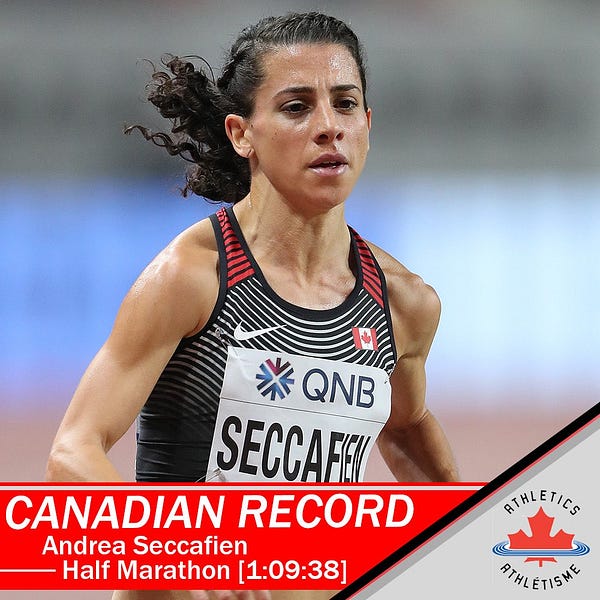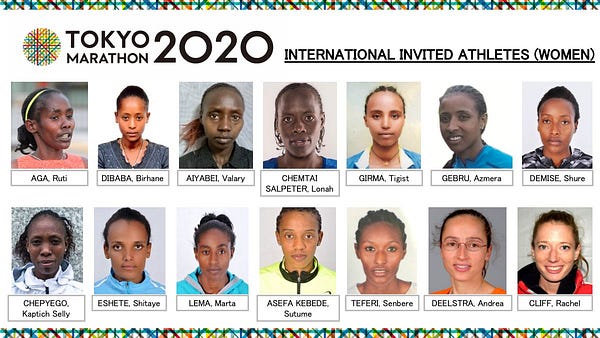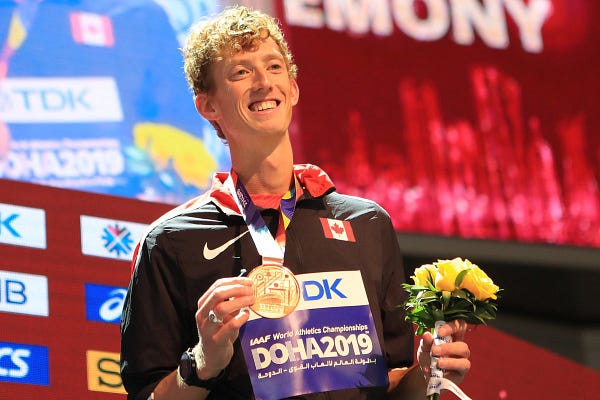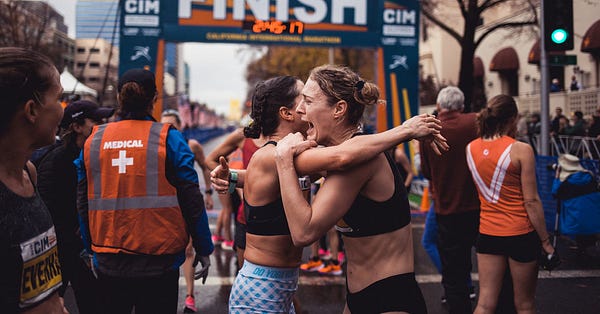Andrea Seccafien breaks the Canadian half-marathon record, shoes get regulated and athletes talk mental health
Natasha Wodak's record didn't last long!
Hello!
It was a quieter week, results-wise, this week. But a Canadian record was still broken. I also have some Canadian takes on the whole shoe issue, some Canadian athletes participated in a Bell Let’s Talk initiative, some Canadian runners appeared on some podcasts and Rachel Cliff announced her spring goal race.
This issue might actually fit in your inbox. A small miracle!
Let’s get to it!
Andrea Seccafien breaks Canadian half-marathon record, runs 1:09:38


Less than two weeks after Natasha Wodak became the first Canadian woman to run under 70 minutes in the half-marathon, Andrea Seccafien became the second — and broke Natasha’s record by three seconds.
Andrea ran 1:09:38 at the Marugame half-marathon, a competitive race in Japan that saw a lot of fast runners from around the world competing. According to Japan Running News, three of the top 8 women set national records. Andrea placed sixth overall in the race.
Her previous half-marathon was in 2018, which was her debut at the distance. She ran 1:13:19 in Gifu, Japan.
The 29-year-old was an Olympian in 2016, competing in the 5,000m. Last year, she represented Canada at the world cross-country championships, at the PanAm Games and at the world championships.
She ran 15:04.67, her personal best and the Olympic standard, in the 5,000m at the world championships, which qualified her for her first world final. There, she broke 15 minutes in the 5,000m for the first time, running 14:59.95 to finish 13th overall.
She said on Twitter that despite this success, she is not interested in moving up to the marathon just yet.
Andrea is from Guelph, Ont., but now lives and trains in Australia with the Melbourne Track Club. She moved there in 2017 because her partner was offered a postdoctoral fellowship, and she thought a change would serve her training.
She wrote about it in a column for Canadian Running in 2017:
Running fast times and achieving good placings doesn’t make me happy in isolation. Success in this sport, or in anything, matters only when shared. Jamie has been my main support and cheerleader for the past eight years and I believe that being close to the people who care about you is what matters the most. A happy runner is a fast runner, as they say. And honestly, who wants to deal with a southern Ontario winter when a place that gets no colder than 10 degrees is on offer?
Natasha was very gracious about losing her brand-new record on social media, congratulating Andrea on every platform.

Three different women have broken the Canadian half-marathon record in the past two months: Rachel Cliff ran 1:10:06 on Dec. 15, Natasha Wodak ran 1:09:41 on Jan. 19 and Andrea Seccafien ran 1:09:38 on Feb. 1. Who will break it next — and how low can it go in 2020?
CBC covers the shoe debate and World Athletics finally drops some regulations
World Athletics finally put out some regulations on shoes. The verdict? Basically: Vaporflys are OK, Alphaflys are not.
The actual rules:
Soles can’t be thicker than 40mm;
Shoes can have only one carbon plate or blade;
Shoes must be available on the open market for four months, prototypes are not allowed;
Spiked shoes can have an additional plate for attaching spikes but their soles can’t be thicker than 30mm.
You can read the full release from World Athletics here.
Just before this ruling broke, CBC covered the shoe debate.
The Current, hosted by Matt Galloway (who is a big runner), did a special where Matt visited a running store to learn about the Vaporflys and then they hosted a panel with Reid Coolsaet, Krista DuChene and sport science writer Alex Hutchinson about the issue.
You can listen to the feature here.
CBC News also covered the issue, writing a story about it and putting a piece together for The National.
Alex Hutchinson was interviewed for this piece as well, saying it’s not really about the shoes: it’s about collectively deciding what’s fair in our sport:
“We have to decide where we're going to draw the line and then everyone who uses things that we've agreed are OK — that's fine,” Hutchinson said. “Lots of things are performance enhancing. It's a question of agreeing on what's going to be acceptable.”
You can watch The National’s piece below:
Reid did all these interviews before the ruling dropped. His take? The rules are all right.


Rachel Cliff is running the Tokyo marathon


Rachel Cliff will be running Tokyo as her third marathon. Rachel debuted in 2018 in Berlin, running 2:28:53, the fastest Canadian woman’s marathon debut ever.
In her second marathon, she broke the Canadian national record, running 2:26:56 in March 2019 in Nagoya, Japan.
That record was since broken by Malindi Elmore in Houston in January.
The run qualified Rachel for the 2020 Olympics in the marathon. However, 2/3 of the Canadian women’s Olympic marathon team have yet to be selected — and Rachel is one of three who is qualified for the two spots. Lyndsay Tessier and Malindi Elmore also have qualified. Dayna Pidhoresky qualified as well, but at the reigning national marathon champion, she was auto-selected to the team. Athletics Canada will choose the other two representatives in the spring.
Rachel started 2019 as the Canadian marathon and half-marathon record holder. Both those records fell in Houston in January.
Also running Tokyo this year are defending champions Ruti Aga (PB 2:18:34) and Birhanu Legese (PB 2:02:48), both from Ethiopia. Alongside Ruti, there are four other women who have run sub 2:20: Ethiopians Birhane Dibaba (2:18:46) and Tigist Girma (2:19:52), Kenyan Valary Aiyabei (2:19:10) and Israeli Lonah Chemtai Salpeter (2:14:46).
Six men in the field have run under 2:05: Birhanu and fellow Ethiopians Getaneh Molla (2:03:34), Sisay Lemma (2:03:36) and Asefa Mengstu (2:04:06), Bahraini El Hassan El Abbassi (2:04:43) and Kenyan Titus Ekiru (2:04:46).
You can see the full elite field here.
The Tokyo marathon takes place March 1, 2020.
Lanni Marchant & Andre De Grasse were part of a special Bell Let’s Talk initiative, Hidden Opponent
Jan. 28 was Bell Let’s Talk Day, an initiative where telecommunications company Bell encourages people to talk about mental health. This year, they partnered with LeBron’s James company Uninterrupted — it’s an “athlete empowerment brand” and, yeah, I’m not sure what that means either — to put out a series featuring Canadian athletes talking about their mental health. They called it “Hidden Opponent.” Three athletes were featured: marathoner Lanni Marchant, sprinter Andre De Grasse and pole vaulter Alysha Newman.
Lanni talks about struggling with illness and training not going well leading into the 2016 Olympics, how it was difficult for her to open up about her struggles and how her father’s death forced her to face it all:
Andre talks about being thrust into the spotlight at the 2016 Olympics, his struggle with injuries in the couple years that followed, and how he leaned into family and learned to talk about it to get through it:
Alysha Newman talked about body image, being a survivor of domestic violence and how she had to rebuild once she got out of that situation:
Natasha Wodak was on I’ll Have Another with Lindsey Hein podcast
Natasha Wodak was the second Canadian in a row to be featured on I’ll Have Another with Lindsey Hein. Last week, Lindsey spoke to Malindi Elmore. This week, she spoke to Natasha Wodak, who had just broken the Canadian half-marathon record.
They talked about Natasha’s coach, her relationship to food and training and more. It was a good conversation, and shows there’s no one right way to approach your running and that positivity is an essential element in success.
Evan Dunfee was on the Clean Sport Collective podcast


Canadian racewalker Evan Dunfee was on the Clean Sport Collective podcast. Clean Sport Collective is hosted by Kara Goucher, Shanna Burnette, and Chris McClung and explores clean sports and talks to and celebrates athletes who are advocates for the cause.
Evan is Canada’s best racewalker, placing fourth in the 50K in at the Rio Olympics and third in the same event at the world championships in the fall. He’s also very outspoken about, well, almost everything, when it comes to sport.
Kara and Chris spoke to Evan about his rise in racewalking, his Olympic and world championship experience, and his opinions on keeping sport clean.
Rory Linkletter was on The Shakeout podcast
Rory Linkletter, coming off his impressive half-marathon debut in Houston, was a guest on The Shakeout podcast. Co-hosts Kate Van Buskirk and Madeleine Kelley kick off the episode with an interview with the 23-year-old, who ran 1:01:44 — the second fastest half-marathon by a Canadian man — in Houston last month.
Rory also dropped the second episode of his new podcast, Running Rivals, which is co-hosted by his NAZ Elite teammates, Matt Baxter and Nick Hauger. You can listen to that here.
Lindsay Crouse writes about failing to make the US Olympic trials for the New York Times, but the article is really about amazing yourself


This piece is getting it’s own section because I loved it. Lindsay is the New York Times journalist behind some of the most important stories in running in recent years: The Shalane Effect, the expose on Nike’s non-existent maternity policies for athletes and Mary Cain’s revelations about her time training with Alberto Salazar as a member of the Nike Oregon Project.
She’s also a fast runner, and decided to shoot for the moon: run 2:45 and qualify for the U.S. Olympic trials. Her mom is Canadian, and this isn’t relevant to anything except we are secretly everywhere and I love it.
Spoiler: she didn’t do it. She ran 2:53 at CIM in December. But that, as she points out in her piece, doesn’t even matter:
I became the kind of athlete I’d always wanted to be. The experience was the embodiment of that cliché about sports — it was empowering. As I trained, I realized I had become complacent in the rest of my life. Wasn’t it all enough? But running shook me out of it. There are a lot of things we can’t control right now, especially for women. Perhaps we choose running because we don’t need permission to do it — we can do it whenever and however we want. The roads are open. And behind those 511 women who qualified are hundreds of others, like me, who transformed ourselves trying.
I’m not American, but we are seeing the same thing — women running faster than they ever imagined into their 30s and 40s — here in Canada, and inspiring so many people in the process. Our recently ousted half-marathon record holder, Natasha Wodak, is 38. Our marathon record holder, Malindi Elmore, is almost 40. Krista Duchene is 43 and still gunning for a spot on our Olympic team. Lyndsay Tessier, who represented Canada in the marathon at the world championships, is 42.
I’m 35. I’m not fast. But this idea that my greatest athletic accomplishments are still ahead of me gives me so much motivation, so much hope — and all these women prove it’s possible.
That’s it for this week! The Millrose Games are this weekend, so I’ll have a recap of the Canadian performances there in the next issue.
If you’re reading this online or it was forwarded to you and you’d like to subscribe, you can do that here:
Run the North comes out every Monday morning.
Thanks for reading and keep on running!
See you next week.




